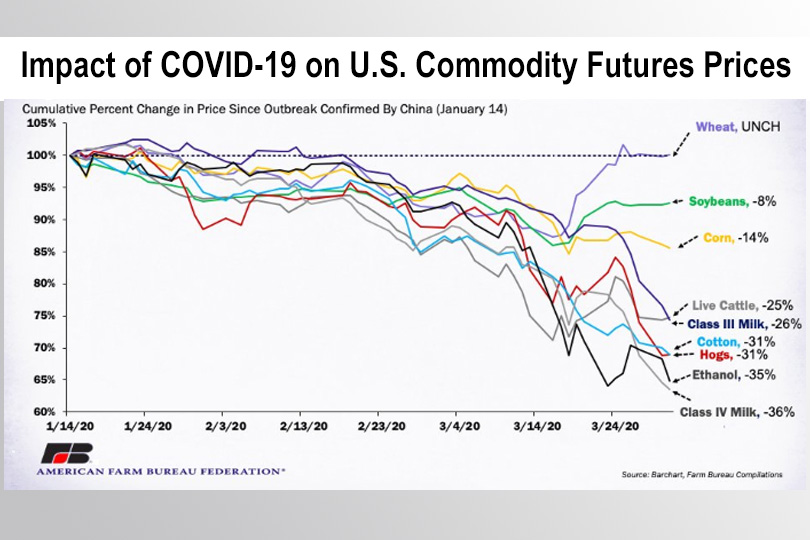From dairy farmers with nowhere to send their milk and cattle ranchers reeling from plummeting beef prices, the impact of the coronavirus is rippling through farm country. Corn, cotton and soybean futures have tumbled. Ethanol plants have been idled, and some fruit and vegetable farmers are finding their best option is leaving produce in the field.
Price forecasts for most agricultural products are bleak.
In the past month, dairy prices have dropped 26-36 percent. Corn futures have dropped by 14 percent, and soybean futures are down 8 percent. Cotton futures have also plummeted 31 percent. Hog futures are down by 31 percent. A surge in demand for beef emptied grocery store meat aisles, but there is no lack of supply. Despite a rise in retail prices in some areas, the prices paid to cattle ranchers have fallen 25 percent.
Dairy farmers were optimistic at the start of 2020 that it would be a turnaround year, with milk prices on the rise and feed costs holding steady. But hopes were dashed when the coronavirus quickly and dramatically impacted demand, disrupted supply chains and led to the 26-36 percent drop in prices.
Schools, restaurants and universities that were among the main purchasers of milk and milk products were suddenly shuttered, leaving dairy farmers with far more milk than plants are capable of processing. The sometimes-empty supermarket milk coolers reflect supply chain adaptation challenges, not lack of supply. Experts do not expect retail demand for dairy to make up for lost food service and restaurant demand.
“Farmers and ranchers are determined to deliver on their commitment to provide a safe and abundant food supply, but make no mistake, they are facing make-or-break struggles, like many Americans,” American Farm Bureau Federation (AFBF) President Zippy Duvall said. “After years of a down farm economy and damaging severe weather, the COVID-19 ripple effects are forcing farmers and ranchers to face heartbreaking financial realities. Without question, the disaster aid provided in the CARES Act is a lifeline that will help many farmers hold on. We don’t know how many for how long, but we’re grateful.”
The CARES Act provides $9.5 billion to the U.S. Secretary of Agriculture for financial support to farmers and ranchers impacted by the coronavirus and $14 billion for the Commodity Credit Corporation. Direct food- and agriculture-related provisions in the CARES Act, including support for the U.S. Department of Agriculture (USDA) and the Commodity Credit Corporation and additional funding for the Supplemental Nutrition Assistance Program, account for only .02 percent of the total aid provided in the bill.
USDA has not yet announced how it will distribute the aid.
Abiding by travel restrictions, people are driving far less, pushing down demand for both oil and ethanol made from corn.
A 35 percent drop in ethanol prices caused some plants to stop production, further depressing corn prices. The sudden change also cut off the supply of dried distillers grains—a byproduct of ethanol production and source of high-protein feed—for livestock producers, who are left scrambling to find a replacement.
“There are millions of people involved in producing America’s food supply. Fewer farms mean fewer farm workers, truck drivers, processors and manufacturers and potentially higher food prices—not today, maybe not even this year, but farmers won’t be the only ones affected by the long-term agricultural impacts of the coronavirus pandemic if prices continue to drop and markets aren’t restored,” Duvall said. “We’re all in this together. No one is more mindful of that than farmers and ranchers who keep planting, harvesting and finding new and creative ways to ensure their products reach America’s dinner tables.”
More detailed information about the coronavirus’ impact on agriculture is available on the AFBF website.

